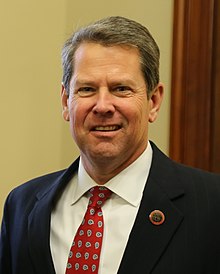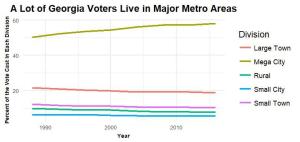Earlier today I noticed, and read, an opinion piece in the New York Times:
Brian Kemp defeated Stacey Abrams in the election to decide the next Governor of the Great State of Georgia, the state of my birth. He ‘won’ the election in 2018 the ‘old fashioned way’ by disfranchising certain segments of society, namely those who would most probably not vote for him, or any republican, for that matter. He could do this because he was the Secretary of State. Former POTUS and Georgia Governor Jimmy Carter implored the Kempster to not eradicate potential voters from the voting register, but the Kempster ignored Jimmy. Unfortunately, the Kempster again defeated Ms Abrams in the next election for the office of Governor of Georgia. Now one reads about his possible future in national politics. The Kempster is BIG on
During the first election for Governor in 2018 the Kempster ran an ad in the media featuring him pointing a shotgun at the boyfriend of one of his daughters which created a media firestorm, which may have been the ‘point’…
When young my father and cousin Nick took me along on a fishing trip. They left me near a small store and were across the lake fishing when I noticed a gun, which turned out to be a shotgun, on the ground near the lake. There was nobody around, so I walked over, put my finger into the trigger, and squeezed. The shotgun went backward at an extremely fast rate of speed, and a plethora of pellets hit the lake…kinda like shit hitting the fan, so to speak. Men came running out of the store and my father and cousin Nick began paddling as fast as possible. The small fishing boat was coming right at me. What could I do other than wait to be yelled and screamed at by my father? Fortunately, that did not happen. He was simply happy I was alive. Cousin Nick gave me a lesson about guns I have never forgotten. Rule number one was to, “NEVER, EVER, POINT ANY GUN AT ANOTHER HUMAN BEING!” After asking if it would be OK to point an unloaded gun at anyone cousin Nick said, “HELL NO! How would you know if’n it was loaded or not?” Nick asked. “Guess you would hafta pull the trigger,” I said. Cousin Nick laughed uproariously prior to saying, “Yeah, like you just did!”
Would you go on a hunting trip with Brian Kemp?
If it seems like there is a mass shooting in the United States every day it is because: There have been more mass shootings in America than days in 2023 (https://abcnews.go.com/US/mass-shootings-days-2023-database-shows/story?id=96609874)

Republicans love their guns.

That is Lauren Opal Boebert, an American politician, businesswoman, and gun rights activist serving as the U.S. representative for Colorado’s 3rd congressional district. (https://boebert.house.gov/)
‘Back in the day’ the Old West was cleaned up and made livable when the cowboys had to leave their guns with the sheriff, as was the case in the Academy Award winning movie, Unforgiven.
Because of Republicans America is armed to the teeth, just like the wild west daze. They obvious want a return to the old ways and old days:

A Hot Mess in the Georgia Republican Party
By Michelle Cottle
Here’s a head scratcher for you: What happens when the leadership of a political party becomes so extreme, so out of touch with its voters, that it alienates many of its own activists and elected officials? And what happens when some of those officials set up a parallel infrastructure that lets them circumvent the party for campaign essentials such as fund-raising and voter turnout? At what point does this party become mostly a bastion of wingnuts, spiraling into chaos and irrelevance?
No need to waste time guessing. Just cast your eyes upon Georgia, one of the nation’s electoral battlegrounds, where the state Republican Party has gone so far down the MAGA rabbit hole that many of its officeholders — including Gov. Brian Kemp, who romped to re-election last year despite being targeted for removal by Donald Trump — are steering clear of it as if it’s their gassy grandpa at Sunday supper.
Republicans elsewhere should keep watch. Democrats too. What’s happening in Georgia is a cautionary tale for pluralism, an example of how the soul of a party can become warped and wrecked when its leadership veers toward narrow extremism. And while every state’s political dynamics are unique, a variation of the Peach State drama could be headed your way soon — if it hasn’t begun already.
The backstory: Some Republican incumbents took offense last year when the Georgia G.O.P.’s Trump-smitten chairman, David Shafer, backed Trump-preferred challengers in the primaries. (Mr. Trump, you will recall, was desperate to unseat several Republicans after they declined to help him steal the 2020 election.) Those challengers went down hard, and Mr. Kemp in particular emerged as a superhero to non-Trumpist Republicans. Even so, scars remain. “That’s a burn that’s hard to get over,” says Brian Robinson, a Republican strategist who served as an adviser to former Gov. Nathan Deal.
The clash also made clear that Republican candidates, or at least popular incumbents, don’t much need the party apparatus anymore. This is part of a broader trend: The clout of parties has long been on the slide because of changes in how campaigns are funded. That got turbocharged in Georgia in 2021, when its legislature, the General Assembly, passed a Kemp-backed bill allowing certain top officials (and their general-election challengers) to form leadership PACs, which can coordinate with candidates’ campaigns and accept megadonations free from pesky dollar limits.
The PAC Mr. Kemp set up, the Georgians First Leadership Committee, raked in gobs of cash and built a formidable voter data and turnout machine. The governor plans to use it to aid fellow Republicans, establishing himself as a power center independent of the state party.
As big-money conduits, leadership PACs can bring plenty of their own problems. But whatever their larger implications, in the current mess that is Georgia Republican politics, they also mean that elected leaders “don’t have to play nice in the sandbox with a group that is sometimes at odds with them,” says Mr. Robinson.
The governor says he will skip the state party’s convention in June, as will the state’s attorney general, its insurance commissioner and its secretary of state. At a February luncheon for his Georgians First PAC, Mr. Kemp basically told big donors not to waste their money on the party, saying that the midterms showed “we can no longer rely on the traditional party infrastructure to win in the future,” the Atlanta Journal-Constitution reported.
New party leadership is on the way. Mr. Shafer is not seeking another term. (Fun fact: He is under investigation for his role in the pro-Trump fake-elector scheme of 2020.) Party delegates will elect his successor at the upcoming state convention. But the problems run deeper. Republican critics say that the party culture has become steeped in the paranoid politics of MAGA and election denial. And in the current environment, “everyone must pledge their undying loyalty to Donald Trump above all else,” says Jay Morgan, who was an executive director of the state party in the 1980s and now runs a public affairs firm in Atlanta.
Mr. Shafer defends his tenure, noting in particular that, since he took over in 2019, the party has gone from being mired in debt to having “over $1 million in the bank.”
To be fair, the Georgia G.O.P. has a rich history of rocky relations with its governors. But the Trump era, which brought a wave of new grassroots activists and outsiders into party meetings, put the situation “on steroids,” says Martha Zoller, a Republican consultant and talk radio host.
“Right now, it’s largely a place disconnected from reality,” adds Cole Muzio, a Kemp ally and the president of Frontline Policy Action, a conservative advocacy group.
That seems unlikely to change any time soon, as some of the party’s more extreme elements gain influence. In recent months, leadership elections at the county and district levels have seen wins by candidates favored by the Georgia Republican Assembly, a coterie of ultraconservatives, plenty of whom are still harboring deep suspicions about the voting system.
One of the more colorful winners was Kandiss Taylor, the new chairwoman of the First Congressional District. A keen peddler of conspiracy nuttiness, Ms. Taylor ran for governor last year, proclaiming herself “the ONLY candidate bold enough to stand up to the Luciferian Cabal.” After winning just slightly more than 3 percent of the primary vote, she declared that the election results could not be trusted and refused to concede — an antidemocratic move straight from the Trump playbook. As a chairwoman, she is promising “big things” for her district. So southeast Georgia has that to look forward to.
Why should anyone care about the state of the Georgia G.O.P.? Well, what is happening in Georgia is unlikely to stay in Georgia — and has repercussions that go beyond the health and functionality of the Republican Party writ large. After election deniers failed to gain control of statewide offices across the nation in 2022, many of them refocused their efforts farther down the food chain. In February, The Associated Press detailed the push by some of these folks to become state party chairmen, who are typically chosen by die-hard activists. In Michigan, for instance, the state G.O.P. elevated the Trumpist conspiracy lover and failed secretary of state candidate Kristina Karamo to be its chairwoman.
MAGA zealots don’t simply present ideological concerns, though their politics do tend toward the fringes. Too many embraced the stop-the-steal fiction that the electoral system has been compromised by nefarious Democrats and must be “saved” by any means necessary. Letting them oversee any aspect of the electoral process seems like a poor idea.
If this development persists, Republicans more interested in the party’s future than in relitigating its past might want to look at how Kemp & Company have been trying to address their intraparty problems — and what more could and should be done to insulate not only the party’s less-extreme candidates, but also the democratic system, from these fringe forces. There are risks that come with ticking off election deniers and other Trumpian dead-enders. But the greater risk to the overall party, and the nation, would be declining to do so.
https://www.nytimes.com/2023/05/01/opinion/georgia-trump.html






